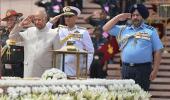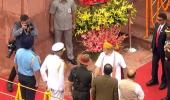'Until and unless he is empowered to be the direct point of contact on defence issues for the prime minister, it will not work.
'The offices of the three Chiefs will lose some of their turf, but in the bargain, it can prove to be a huge boon in terms getting the bang for the buck that we earmark for our defence budget,' points out Brigadier S K Chatterji (retd).
Illustration: Uttam Ghosh/Rediff.com

Two decades after the Kargil War, the prime minister has promised the nation from the ramparts of Red Fort that the prime recommendation of the Kargil Committee Report will be implemented.
The Kargil Review Committee had recommended the creation of the post of Chief of Defence Staff who would lead the combined forces of the entire nation and plan their joint employment in operations.
A lot will depend on how far the CDS is empowered.
Giving him the equivalence of other Chiefs will not serve any better purpose than what the current system of the senior-most Chief also donning the hat of Chairman Chiefs of Staff Committee, does.
He needs to be ahead of the three Chiefs and above the defence secretary.
Real empowerment will require giving the appointee a higher status.
Only then will he be able to perform his envisaged primary function, that of being a single point of contact for the prime minister and the defence minister.
The CDS nominated will have his hands full.
There is woeful lack of integration between the ministry of defence and the three service headquarters.
The jointness between the three services is an equally sour point.
The first priority of the CDS would be to make effective the actual integration of the bureaucracy and the service headquarters.
When the Integrated Defence Staff was created, provisions were made for officials of the ministry of external affairs and ministry of defence being a part of it.
The implementation of these provisions might as well progress now.
Force restructuring to operate jointly would need to be a priority with the new CDS.
The CDS will have to push for joint theatre commands to be created.
As of now we have only the Andaman and Nicobar Command and the Strategic Forces Command functioning as joint commands.
It's time to re-organise our multiple single services commands into fully amalgamated joint structures.
The exercise has to be taken very deliberately and, yet, along a timeline with milestones clearly marked to ensure progress.
The existing joint commands must come under the CDS along with strategic assets.
As the senior-most military officer of the government, the CDS will have to translate political aims of force employment into military objectives and response options.
Joint capability development to achieve military objectives will also be the responsibility of the CDS.
Training and equipment inventory play a major role in capability development.
The CDS office will need to be geared up for it.
As it stands, certain training institutions are already under the HQ Integrated Defence Staff.
The CDS will need to identify areas requiring furtherance of joint training and either create or use existing assets for the purpose.
The CDS office will be central to evolving joint operational doctrines.
Some progress has been made by the IDS; however, large areas remain unaddressed.
This would be a priority area for the CDS.
It will require involving the three service headquarters intimately, along with think tanks and other agencies.
Such domains like space and cyberspace, that require immediate attention and capability-building, are suited to be pursued by the office of the CDS.
The budget for the armed forces needs primarily to be processed through the office of the CDS and the office provided the wherewithal for the task.
Sub-allocation to each of the services needs to be undertaken by the CDS.
Threat assessment to the country would be one of major responsibilities of the CDS.
While service-specific intelligence agencies need to continue, the Defence Intelligence Agency needs to have a larger mandate both in terms of internal and external intelligence.
An area where the CDS can make a marked difference is procurement of weapon systems.
There is a necessity of ensuring compatibility of systems of the three services in order to enhance jointness and interoperability.
The CDS office needs to ensure this at the procurement stage.
In addition, joint purchases provide an opportunity of acquisition at lower prices on account of enlarged scales of procurement.
The CDS office will need to push for simplification of Defence Procurement Procedures and create more space for private players to enhance competition, lower costs and improve quality of systems and equipment procured.
The entire gamut of military diplomacy and peace-keeping operations under the UNO, needs to be planned by the CDS.
With such issues being in the CDS domain, it's all the more important that officers from the Indian Foreign Services be posted to the office of the CDS for intimate advice and co-ordination right from the planning stage.
Issues like co-ordination of foreign visits and HADR (Humanitarian Aid and Disaster Relief) operations should also be planned and co-ordinated at the office of the CDS.
The CDS has a huge agenda to push when he slips into the slot.
The effectiveness of the CDS will be decided by the status that is conferred on the appointment.
Until and unless he is empowered to be the direct point of contact on defence issues for the prime minister, it will not work.
The offices of the three Chiefs will lose some of their turf, but in the bargain, it can prove to be a huge boon in terms getting the bang for the buck that we earmark for our defence budget.
It will also definitely enhance our operational capability.










